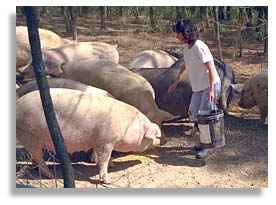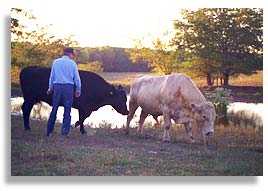|
5-point plan for family farm policy Interview with Bryce Oates Columbia, Missouri
In Motion Magazine: I understand you recently went to an event in Washington, D.C. Why did you go there? What was going on? Bryce Oates: We went there to respond to the economic and social crisis in rural America. The event came together through a lot of channels. Mostly, Senator Wellstone from Minnesota had been calling for a national rally of farmers and others concerned with rural America to come to Washington this Spring. He had started calling for this event last fall and it culminated in this Rally for Rural America. The event was organized by grass-roots farm groups all over the country, participating in conference calls and face-to-face meetings about how to bring the most farmers and other rural citizens together around a common message. That common message became the 5-Point Plan for Family Farm Policy which we helped to create and disseminate. In Motion Magazine: What was the date of the rally? Bryce Oates: March 20 and 21. In Motion Magazine: Can you name some of the other groups that were there? Bryce Oates: Iowa’s Citizens for Community Improvement participated. Land Stewardship Project from Minnesota. The Federation of Southern Cooperative Land Assistance Fund. Numerous Farmers Union chapters and the National Farmers Union people. The National Family Farm Coalition and the Western Organization of Resource Councils. There were lots of others but those were some of the main organizers. In Motion Magazine: How many people came from Missouri? Bryce Oates: About 75 Missouri farm families were there. We took 25 with us. In Motion Magazine: How many people gathered there from all the states? Bryce Oates: About 3,000. In Motion Magazine: Where was it held? Bryce Oates: On the capitol mall in Washington. The 5-Point PlanIn Motion Magazine:What is an accountability card? Bryce Oates: We took our 5-point plan for family farm policy and translated it into half-sheet blue cards which ask questions to a congressional representative about the 5-point plan. For instance, point number one, “Immediately pass a new farm bill.” Will you establish a non-recourse loan at true cost of production to ensure that farm income comes from the marketplace and not from tax-payers? Next to the question you marked whether your congressional representative said yes or no. The idea was to bring all the cards together and put up a national score card of how congressional representatives feel about our 5-point plan. In Motion Magazine: What were some of the other five points? Bryce Oates: Well, as I just said, the first point is immediately pass a new farm bill. The second point is restore competition to the market place through strict enforcement of anti-trust laws. The third point is protect consumers and the environment. The fourth point concerns holding referenda on the mandatory pork and beef check-off. The fifth point is negotiate fair trade agreements.
Bryce Oates: OK. To pass a new farm bill. We’ve written a new farm bill called the Food From Families Act which does five major things. It establishes a non-recourse loan, a true cost of production which makes farm income come from the marketplace and not the taxpayer as it does today. It enacts a short term conservation measure to avoid the wasteful overproduction which not only mines the soil but also over-produces commodities which drives prices down. It creates a farm-owned reserve to ensure food security in times of scarcity and price stability whenever there’s plenty of production. It maintains planning flexibility decisions on individual farms. And it establishes dairy policy that ensures cost of production plus a return on investment through a farmer-controlled inventory plan. Those are the major points on the farm bill and what we’re doing now is organizing around the Food from Family Farms Act to puts those points together in a unified whole. The second point of our 5-point plan concerns restoring competition to the marketplace. We want to place a moratorium on mergers of agribusiness companies so that agribusiness, transportation, food processing and retail companies are not allowed to merge into mega-companies which have a huge amount of capital and political power. We want strict enforcement of the Packers and Stockyards Act to end price discrimination across the country. And we want a ban on packer ownership of livestock to remedy the problem of corporate price-fixing in the marketplace. With the third point, on protecting consumers and the environment, we want to require labeling of meats and foods imported into the U.S. to give consumers the right to know what country their food is grown in. We want to stop the expansion of large scale factory farms. We want to protect environmentally fragile lands and habitat. The fourth point of holding the mandatory pork and beef checkoff referenda as soon as possible is self-explanatory. We just want those referenda to be held immediately as petitioned by independent cattle and hog producers. Lastly, on negotiating fair trade agreements, the point there is we want international cooperation among farm countries and not the international race-to-the bottom we have in current trade programs. We want to insure that all countries retain the right to develop farm programs that respond to the needs of their individual farmers and consumers. We want to put an end to export dumping. Export dumping is the sale of commodities below cost of production and it undermines every country’s domestic economy. We want to ensure environmental protection, fair wages, and worker rights as a part of every trade agreement that goes on between nations. Race to the bottomIn Motion Magazine: What does race-to-the bottom mean? Bryce Oates: In race-to-the-bottom what you have is different countries vying for jobs and other aspects of economic development by having a decreased level of environmental and social standards. For instance, when NAFTA passed there were no safeguards to protect the Mexican environment and to protect Mexican workers from pollution and working long hard hours. Instead, American companies simply exported their jobs to Mexico. This didn’t increase economic benefits to Mexican workers or the Mexican people. It basically gave them low wages and dangerous jobs. There is a descending cycle of companies exporting their jobs to places where the environmental and social impacts of a company’s business practices are not taken into account. That’s the race to the bottom we are talking about. In Motion Magazine: Are you saying that globalization is going to happen and these various trade agreements are going to happen but they should be done in a better way. Bryce Oates: Yes, it needs to be done in such a way as to not undermine a sovereign nation’s right to determine who grows their own food and who doesn’t. To determine who gets access to the food and who doesn’t. Globalization is occurring but that doesn’t mean there shouldn’t be democratic mechanisms for local control in place at the same time. In Motion Magazine: The five points you’ve described were adopted by the general gathering of farmers? Bryce Oates: Yes.
In Motion Magazine: And then there was a rally? Bryce Oates: There was a press conference to kick off the event at which Bill Christison, our president, spoke. He outlined the 5-point plan in his talk. After that there was a Farmer Share luncheon which was well-attended by the media and Congressional people. This event illustrated that for each lunch food retailers were getting eight dollars, and the farmer’s share of that meal was forty cents. This showed who’s getting the wealth out of the food system. It’s not the farmer, it’s not the primary producers of the product. It’s the middle men and the retailers and the corporations. Rhonda Perry, MRCC’s director, spoke at that event alongside Secretary of Agriculture Dan Glickman. In Motion Magazine: And after this lunch? Bryce Oates: There was a Congressional town hall meeting. It was mostly Congress people telling us what they were going to do about farm policy and rural America in general. In Motion Magazine: Were there many meetings with congresspeople and senators? Bryce Oates: There were tons of meetings. We met with three of Missouri’s representatives and every state had the same strategy. The next morning there were people all over the Hill meeting with their senators and representatives, using their accountability cards to grade them on what they were going to do for farm policy. In Motion Magazine: Represesentatives of how many states were met with? Bryce Oates: At least 25 or 30. In Motion Magazine: How would you judge the response? Bryce Oates: We don’t exactly know right now. The meetings all seemed to go pretty well from people I talked to but the proof is in the pudding. We’ll see what kind of things they do, whether they were just blowing smoke to us because we were there or whether they are actually going to do something about the 5-point agenda and put a good pro-active farm policy in place. In Motion Magazine: When would be the first indication of that? Bryce Oates: We’re looking for support on the Food from Family farms act right now. There is no Congressional representative who is taking that farm bill and proposing it. Also the Freedom to Farm Act has got to go or at least be tinkered with. They could immediately do things like increase the loan rate to cost of production. They could pass the merger moratorium act. They could ban packers from owning livestock this congressional session. There are bill’s being proposed that do all those things. Biodevastation 2000In Motion Magazine: You also went to Boston. What was going on in there? Bryce Oates: It was the 4th grass-roots gathering on genetic engineering called Biodevastation 2000. The first gathering was in St. Louis, the second one in India, the third in Seattle. The event brought together consumer and environmental groups, students, labor, and farmers from all over the country to talk about what we are going to do about the corporate takeover of the food supply in the form of biotechnology. It was the largest gathering of its kind in this country. It’s an unprecedented coalition of farmer labor, environmental and consumer constituencies forming around a common goal of ending domination of seed by Monsanto, Novartis and other biotech companies. Seed is the building block of the food system. In Motion Magazine: There was also an industry meeting going on in Boston? Bryce Oates: That’s why this event was held in Boston. The biotech industry organization was meeting there too to tout the wonderful benefits of this technology. We believe it’s ridiculous that they tout these benefits of feeding the world when they have no basis in reality because the problem of hunger has never been a problem of production. It’s a problem of access to the wealth of a society. It’s a problem of lack of democracy. Rather than just throwing lots of money and technological skills at a problem we need to attack the root of the problem of hunger with more democracy and more local control of the food system. It’s the tail wagging the dog for these folks. They don’t understand the reality of the food system. By concentrating on such a small piece they’re sucking large resources away from pro-active grassroots attempts to take back the food system, to take back democracy from corporate control. Planting DecisionsIn Motion Magazine: Has the presence of farmers within this movement grown? Bryce Oates: The presence of farmers has been very important and it has improved. A lot of folks don’t understand that farmers are a key piece of this issue. Farmers are probably the key piece because they make the planting decisions about which variety of crops they are going to plant on their farm. Also many people don’t understand that corporations targeted farmers as the key constituency to talk to about the benefits of this technology. Ofcourse, those corporations lied when they said that these biotech crops were going to save farmers money and increase production. The reality of the matter is that these crops cost more and yield less than traditional varieties. It’s a matter of us organizing farmers to understand that GMO companies are telling lies and that science shows us that yields are less from genetically engineered crops, that pesticide costs are higher, that crop costs are higher. Once farmers understand that there isn’t much of a choice. Why would you want to pay more for something that is going to yield less. It doesn’t make any sense. In Motion Magazine: Do you have direct relations with farmers in other countries? Bryce Oates: We have. We’ve worked with farmers in Europe. Bill Christison just got back from a European trip. We’ve been in contact with farmers in India. We work through Via Campesina internationally. Via Campesina is a group of farmers and peasants throughout the world which is organizing on this issue. In Motion Magazine: How would you assess this gathering in Boston? Bryce Oates: It was extremely successful. It brought together diverse groups around a common goal. We broke up into regional networks and made a commitment to helping one another out, coordinating op-eds, and media materials so that we would be diverse with our message. In Motion Magazine: There was a rally? Bryce Oates: There was a rally of about 4,000 people in front of where the biotech industry organization was meeting to bring attention to what these companies are doing. |
||||||||||||||||||||||||||||||||||||
|
Published in In Motion Magazine - April 29, 2000 Also read:
|
||||||||||||||||||||||||||||||||||||
If you have any thoughts on this or would like to contribute to an ongoing discussion in the  What is New? || Affirmative Action || Art Changes || Autonomy: Chiapas - California || Community Images || Education Rights || E-mail, Opinions and Discussion || En español || Essays from Ireland || Global Eyes || Healthcare || Human Rights/Civil Rights || Piri Thomas || Photo of the Week || QA: Interviews || Region || Rural America || Search || Donate || To be notified of new articles || Survey || In Motion Magazine's Store || In Motion Magazine Staff || In Unity Book of Photos || Links Around The World NPC Productions Copyright © 1995-2020 NPC Productions as a compilation. All Rights Reserved. |
||||||||||||||||||||||||||||||||||||




